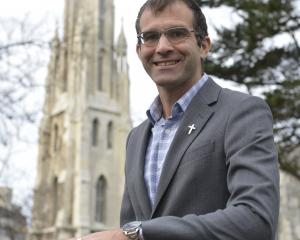When it comes to the media, churches appear to be regarded as a free fire zone, where anything goes, writes historian and theologian Peter Matheson.
The exception seems to be anything to do with religion.
The churches appear to be regarded as a free fire zone, where anything goes, and the usual conventions around fact-checking and objectivity do not apply. A good example was a recent article in the ODT by Chris Trotter.
Few of us would agree all the time with Chris, but generally his contributions, however provocative, are backed up by research and a well-stocked mind. He is well worth listening to. Yet off he goes here with wild exaggerations about New Zealand's Protestantism being "conservative and evangelical", out to mind-blast the young and vulnerable.
And this, sadly, is typical of much media ignorance.
It seems we can't get beyond caricatures. The terms "Presbyterian" or Calvinist are almost invariably associated with censorious moralism, while Anglicanism is dismissed as bland and nominalist, though the role it has taken, for example, in recognising the implications of the Treaty of Waitangi is in many ways exemplary.
Likewise, there is the current tendency to be dismissive of anything emanating from the Catholic Church because of its sorry involvement in sexual abuse.
This may be understandable. There must be zero tolerance of such abuse. But do we reject wholesale every film from Hollywood, every rugby league team, on similar grounds?
All this matters because we are mauling reality. Why don't the media see this? One problem, evident in some New Zealand historians as well, may be a lack of acquaintance with religious language and sensibility. We seem to have lost the tools to interpret religion adequately, although it is about the poetry of life, its passion and tragedy, its reach for transcendence.
Our musical and literary traditions are drenched in religious themes and aspirations. And if you look at the social crusades and investments of Methodism down the years, or at the educational ethos of New Zealand Protestants, including evangelicals (an entirely different breed by the way from Trump's hangers-on) it is entirely understandable that these days you can hardly find any reservoir of people more committed to environmental justice, for example, than one finds in the churches.
There are good theological reasons, after all, for their concern for creation.
As we transit to an unbelievably challenging future we desperately need to forge new alliances between people of goodwill. However good the budgets of the future may be it is not going to be easy to beat child poverty, to clean up our rivers, to confront the issues of addiction and cultural despair.
Political parties and environmental movements will not make it on their own. It is significant that in the area of public health the crucial role of spirituality is increasingly being recognised. The other day I attended a particularly sad funeral jointly conducted by a Catholic priest and a Presbyterian minister.
It highlighted the sensitive and costly pastoral care that is the hallmark of good churchmanship but which never hits the headlines.
If the media were to study the churches as they actually are these days they would discover a hugely varied picture, which will of course include conservative and reactionary dimensions. The latter, however, do not dominate, as so much media coverage insinuates. A recently published book from Victoria University Press, Pursuing Peace in Godzone, which is selling well and lauded by such relatively un-conservative and un-evangelical figures as Nicky Hager, is part of a series which documents the massive contribution made by the churches to reconciliation and peace down through New Zealand history.
As a life-long radical within the Church, I could not be more aware of its multiple failings. It is imperative that they be pointed out. But caricatures get us nowhere. Black-tinted glasses need to be discarded. Fairness is a sterling Kiwi characteristic. What about the media giving it a go in this case?
Social media, of course, is something else.
- Peter Matheson is a Dunedin historian and theologian.
Comments
We have a modern liberalism which seems to regard Christianity as the enemy. A good example is Bob McCoskrie at Family First NZ. He recently organised a petition related to having controls on pornography. He put forward a very good case but was subjected to a lot of vitriol on social media and an online media platform about his Christian beliefs. I thought these comments would not be allowed if he was coming from a different perspective.
I don't think any fair-minded person would deny that Christianity has been a large part of our social history and is worthy of study.
However... Peter Matheson completely ignores the point of Chris Trotter's article, which was that Christian evangelicals are entering our primary school with the express purpose of converting children to their religious faith.
Before he can complain that his religion is not getting the respect he thinks it deserves, perhaps he should address the shameless arrogance of Christian parents voting to close a secular state primary school in order to evangelise to impressionable and vulnerable children?
Why should non-Christian parents submit to this attack on our children by the same faith he claims is so worthy of respect?
In the end, if beliefs between Christian and non-Christian people become unacceptable to each other, the choice of the the Christian faith becomes sanctification , which is separation from the non-Christian culture and activities. With this separation ,the rest of society gets to see the results of each direction, and then can make its own decision on which culture proves better for the future.
Fundamentalism is the problem, not Revivalism.












